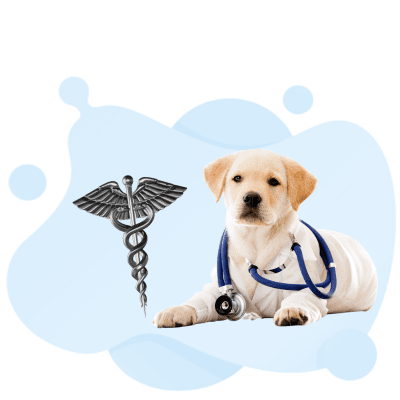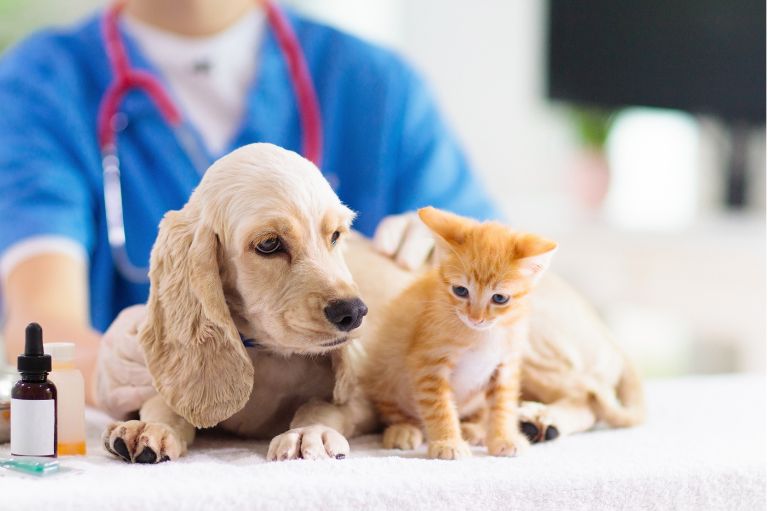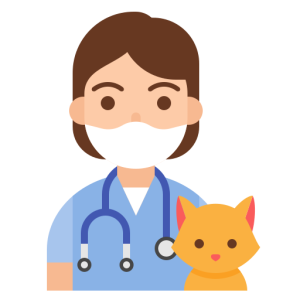Doctor of Veterinary Medicine 2025

A Doctor of Veterinary Medicine is a degree for those who wish to become veterinarians. It takes more than just a high GPA and letters of recommendation to be admitted. Applicants need to complete 60 credits of necessary college coursework.
You’ll learn with world-leading lecturers, including pharmacologists and vaccine developers, medical specialists, and animal welfare and public health experts. You’ll also have access to a range of teaching facilities, from new animal anatomy laboratories and student collaboration spaces to our refurbished Parkville veterinary hospital.
Free DVM Doctor of Veterinary Medicine Practice Test Online
DVM Meaning
A veterinarian is a doctor for animals, and they are responsible for healing and saving animal lives. They work in clinics, hospitals, and zoos to provide medical services for pets and other animals. They also treat injured animals, educate pet owners, and put ill or dying animals to rest. Veterinarians must be able to handle tough situations, such as delivering bad news to pet owners or putting animals to sleep.
To become a veterinarian, you must complete a four-year degree program at a veterinary school. The program will prepare you to diagnose and treat diseases in dogs, cats, horses, livestock, and wild animals. You will also learn about research and laboratory techniques. Veterinary schools offer both theoretical and clinical courses. In order to apply for a veterinary degree program, you must have a bachelor’s degree in science.
You can also find a dual degree program that combines veterinary medicine with public health. These programs are offered by some general universities, but you must be aware of the requirements and expectations for this type of degree.
DVM MPH
A veterinary medicine degree prepares graduates to lead in global population health, particularly the surveillance and control of infectious diseases. The curriculum teaches students how to design a research study, collect and analyze data, and communicate the results. It also offers a more diverse set of electives than an MPH program, including risk analysis, simulation modeling, diagnostic test evaluation, ecology, zoonotic diseases, food safety, and leadership.
The best dual DVM/MPH programs offer extensive fieldwork and applied practical training, making them a valuable addition to any veterinarian’s professional portfolio. Applicants must meet the admission criteria of the veterinary school and the MPH program.
University of Tennessee Knoxville’s dual DVM/MPH program allows qualified undergraduate and graduate veterinary students to earn an MPH in their four-year DVM program, using MPH course credits from the UT graduate curriculum, and relevant fieldwork. Students have completed internships with the Centers for Disease Control and Prevention, US Department of Agriculture, the National Institutes of Health, the Tennessee Department of Health, and various local public health agencies. Many of these jobs require a board-certified veterinary preventive medicine (VPH) specialist, who has earned an MPH with a VPH concentration.

DVM 360
The first step in becoming a veterinarian is to complete an undergraduate degree at a four-year school. You should take courses that include chemistry, biology, zoology, physics, microbiology, and anatomy. These prerequisites will help you pass the veterinary school admission exam. You should also try to get as much experience as possible with animals and in the veterinary industry.

During the second year of veterinary school, students will be required to participate in a research project. The projects can range from conducting a literature review to working on a clinical case study. Ross Vet has several labs where students can work on these projects.
Veterinary medicine is a field that requires compassion, decisiveness, and manual dexterity. The ability to communicate clearly is essential, as well. You should also be able to think critically and analyze situations. This will allow you to provide the best care for your patients. Veterinary medicine also involves extensive travel, so you should be able to handle long periods of time away from home. In addition, it’s important to have good leadership skills and be able to work in teams.
VMD vs DVM
When you take your pet to the veterinarian, you may notice a series of letters after their name. These initials are indications of the veterinary school that they attended and their area of specialty. Veterinarians have a unique career that requires both in-depth knowledge of animal sciences and strong people skills. They work in a variety of settings, including private practice, animal shelters, and zoos. In addition, they can also work in research and education.

It takes a minimum of eight years to get a veterinary degree in the United States. This includes four years of undergraduate study and four more at a veterinary school. While this is an extensive amount of time, it can provide excellent opportunities for veterinary careers. However, you can also consider other degrees that are available. These include the BVMS (Bachelor of Veterinary Medicine and Surgery) program, which is offered in some universities. This program emphasizes animal science and husbandry and provides students with practical training. There are also several other veterinary specializations, such as dermatology and ophthalmology, that offer additional training.
DVM License California
The practice of veterinarian medicine is an extremely complex and challenging task that requires a very special skill set and commitment to care. State law has long recognized this fact and imposes licensing requirements that are difficult to meet. These regulations are typically designed to protect the public from improper and dangerous activities carried out by veterinary doctors.

To be eligible to apply for a license in California, a prospective veterinarian must have graduated from an accredited veterinary college. Alternatively, the applicant may have completed an equivalent program of education and experience that is approved by the board. In addition, the candidate must pass an examination regarding the statutes and regulations of the veterinary medical board.
Applicants must also disclose all states, Canadian provinces and United States territories in which they are currently or have ever held a license to practice veterinary medicine. Failure to do so could result in a denial of a license. The board must also review any disciplinary or enforcement history of the potential veterinarian in each jurisdiction before making a decision.

DVM Minnesota
A Doctor of Veterinary Medicine is the highest credential awarded to veterinarians. This degree has the power to improve the health and well-being of animals by preventing disease, improving food safety, and supporting medical advancements. Many veterinarians pursue careers in private practice, while others find themselves working for the government or pursuing specialty fields. In addition to a rigorous academic program, most universities also require extensive clinical experience and competitive Graduate Record Exam scores.
Dr. Anna Wolff is a native of Eagan and is excited to be back in her home state! She received her undergraduate degree from Gustavus Adolphus College and her veterinary degree from Ross University. She has a passion for preventative medicine and enjoys her job immensely. In her free time, she loves traveling and reading. She also enjoys hiking, playing and listening to music, and having game nights with her friends. Licensed veterinarians are required to complete criminal background checks as part of their licensing process. These checks may vary from state to state.
Texas DVM License
The Texas Department of Public Safety handles a variety of important tasks, including issuing driver’s licenses. While many people assume that the DMV and DPS are the same, they have very different responsibilities. DPS is responsible for ensuring the safety of all drivers and protecting consumers from bad dealerships and bait-and-switch tactics.
A veterinarian must have a license to practice in the state of Texas. To obtain a license, a veterinarian must complete a certain number of continuing education hours each year. In addition, the veterinarian must provide accurate veterinary records to the Board. Moreover, the veterinarian must not engage in a partnership with another person who is not licensed to practice veterinary medicine in the state of Texas.
During a hearing last week, lawmakers debated ways to resolve the dysfunction at the TBVME. While lawmakers want to give the TBVME a chance to turn things around, they also worry about giving TDLR control over medical oversight. The TDLR, they say, does not have the training or expertise to make decisions about medical practice.
DVM PhD
Veterinarians work with animals to treat them and prevent diseases. They can work in a variety of settings, including zoos, animal clinics and hospitals, and research laboratories. Some veterinarians also have private practices where they treat pets. They must pass a licensing exam to become licensed in their state.
Students in the veterinary science graduate program conduct research related to animal health and welfare, human and ecosystem health, genetic research and therapies, virology and bacteriology, population medicine, and more. Students may choose to focus on a particular area of research. Dual-degree programs are available for those who want to study veterinary science from both research and clinical perspectives.
Veterinary scientists can find employment at research institutes, universities, pharmaceutical companies, and governmental agencies. They can also pursue careers in animal shelters or sanctuaries. They can even help develop new drugs and medicines for pets and farm animals. This is a high-paying career that can be very rewarding. However, it is important to be aware of the potential emotional repercussions of this career.
DVM Questions and Answers
A veterinarian (vet) is a physician who practices veterinary medicine. They treat a variety of health issues and injuries in nonhuman animals. In addition, veterinarians play a role in animal reproduction, health management, conservation, husbandry, breeding, preventive medicine such as nutrition, vaccination, parasite control, biosecurity, and zoonotic disease surveillance and prevention.
The DVM, or Doctor of Veterinary Medicine, is required to become a veterinarian. The duration of a DVM program is normally four years, and it includes extensive training in animal sciences. You can also master medical skills with an emphasis on their application to non-human animal kingdom members. Continue reading for more information about DVM degree programs.
The completion of a Doctor of Veterinary Medicine (DVM) degree normally takes four years. It is a curriculum leading to a professional degree that prepares students to become veterinarians. During these four years, students engage in a comprehensive program that combines classroom education with clinical practice. The curriculum includes animal anatomy, physiology, pathology, pharmacology, surgery, and diagnostics. Graduates of the four-year DVM program are eligible to pursue licensure and begin their careers as veterinarians upon completion.
Steps to becoming a veterinarian:
- Get a BSc.- After high school, get a Bachelor of Science in chemistry, biology, animal biology, zoology, or other science. Most four-year undergraduate programs include veterinary-preparation studies. To prepare for vet school after college, check with veterinary institutions for required courses.
- Vet school- Applying to a recognized veterinary school is the next step to becoming a vet. A Doctor of Veterinary Medicine requires four years of education and clinical experience in most vet institutions (DVM). Pass the North American Veterinary Licensing Examination (NAVLE) to graduate. Some veterinary schools require aspiring veterinarians to work at veterinary clinics or animal shelters, farms, or stables.
- Get licensed- Apply for licensure in your state after earning your DVM. The American Association of Veterinary State Boards-supported certification exam required (AAVSB). Independent study and veterinary school can prepare you for the exam.
- Intern- After licensing, many veterinarians intern with a veteran. New veterinarians can practice under supervision before beginning a practice or operating independently. Most internships last a year and teach new vets about the administrative, business, and operational side of veterinary practice.
- Specialize.- Veterinarians can specialize in anesthesia and surgery like doctors. Vets can study over 40 animal care and medical specialties. Depending on the field, specialized programs take two to three years.
- Get board-certified- Finally, some veterinarians choose board certification. Veterinarians who pass a tough exam are board-certified. Each specialty’s organization certifies. Veterinarians need not be board-certified.
The Doctor of Veterinary Medicine (DVM) is a six-year graduate degree program with a two-year pre-vet and four-year vet curriculum.